by Cieslafdn | Apr 18, 2017 | Rosenwald Grant Recipients
Julius Rosenwald’s legacy includes the creation of the Rosenwald Fund Fellowship, which supported African-American intellectuals in the pursuit of advanced scholarship. Among the esteemed class of recipients was W.E.B. Du Bois, best known for his work as a civil rights activist; however, he was not the only one in his family to have received the honor. W.E.B. Du Bois’ wife, Shirley Graham Du Bois, also shared this distinction. Graham Du Bois was recently profiled in Yale Alumni Magazine.
Shirley Graham Du Bois was an intellectual and creative force of nature in her own right in the 1930s up until her death in the 1970s. Her exceptional talents as a composer and musician led her to opportunities to study at the Sorbonne in Paris and at Oberlin College, where she received both her bachelor’s and master’s degrees in music composition.

Shirley Graham Du Bois
(Image from Yale Alumni Magazine and the Library of Congress)
In 1938, Graham Du Bois became the recipient of a Rosenwald Fund Fellowship, supporting her doctoral studies at Yale in playwriting. Graham Du Bois’ literary and musical works reflected on African American history and the African American experience, commenting on racial prejudice and bigotry in America. Her bend towards civil rights activism continued when she joined the NAACP, during which time she also wrote and published a collection of biographies on African Americans. Her book on Frederick Douglass earned her a Julian Messner award in 1946.
Graham Du Bois continued her civil rights work up until her death in 1977. The connection between her legacy and that of Julius Rosenwald demonstrates the important impact of the Rosenwald Fellowship in the support of African American artists and activists in the 20th century.
Read the article in Yale Alumni Magazine here
by Cieslafdn | Apr 18, 2017 | Rosenwald Grant Recipients
The Ciesla Foundation shares the news of the passing of philanthropist and entrepreneur Eugene M. Lang on April 8, 2017. Like Julius Rosenwald, Lang’s prolific philanthropy made a tremendous impact on education through schools and scholarships–a legacy that endures today. He was a modern day Rosenwald.
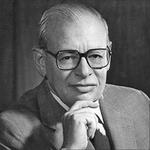
Eugene Lang
(Image from The Washington Post)
“Commentators often described Lang as the ‘most creative philanthropist in America.’ The combination of entrepreneurial instincts and creative imagination that fueled his diverse business ventures around the world characterized his philanthropic ventures as well. He initiated education, health and arts enterprises that are recognized for their ingenuity and transformational accomplishments.”
Read Lang’s obituary in The Washington Post here
by Cieslafdn | Apr 18, 2017 | Rosenwald Screenings
Following a special April 6 screening of Rosenwald at Hampton University, Virginia Governor Terry McAuliffe announced a National Park Service grant to help Virginia identify and survey the sites of former Rosenwald schools. The Virginia Department of Historic Resources and Preservation Virginia will receive $50,000 from the Underrepresented Communities Grant Program to support its longstanding effort to properly recognize the schools with state historical markers and designations to the Virginia Landmark Register and National Register of Historic Places.
The screening was organized by Ms. Brett Glymph, the Director of Virginia Outdoor Foundation. Mr. Bill Thomas, Hampton’s University Associate Vice President, introduced filmmaker Aviva Kempner who talked about the film and answered questions. President William R. Harvey of Hampton University introduced the Governor who made the announcement. President Harvey hosted a lovely reception afterwards. The screening was the latest showing of Rosenwald screenings scheduled for the Southern tour of Historical Black Colleges, supported by Reva and David Logan Foundation.
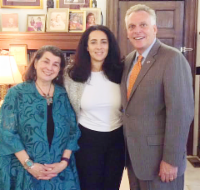
Left to right: Filmmaker Aviva Kemper with Brett Glymph, Director of Virginia Outdoor Foundation and
Virginia Governor Terry McAuliffe
The Governor’s office released a statement. “In Virginia and beyond, ignorance has been used as a weapon of oppression. Education has always been the salvation of the oppressed,” said Governor Terry McAuliffe. “By building schools, Rosenwald and Washington confronted racism at its core and laid a foundation for the Civil Rights Movement. The legacy of their labors continues to shape our Commonwealth and country today.”
The Rosenwald Rural Schools Initiative provided matching grants to support the construction of educational facilities designed by professors from the all-Black Tuskegee Institute. By requiring buy-in from both white school boards and Black communities, the Initiative ensured that, once built, the schools would have the resources and support necessary to succeed. A 2011 study by the Central Reserve Bank of Chicago found that the Rosenwald Rural Schools Initiative achieved significant educational gains in the Southern Black community, with the largest impact seen in the most disadvantaged areas.
“The history we chose to recognize is as much an illustration of who we are as who we were,” said Secretary of Natural Resources Molly Ward. “This grant will allow us to continue the important work of bringing much-deserved focus to these unfairly forgotten schools and their untold stories.”
“This generous support from the National Park Service enables the Department of Historic Resources to continue its efforts to recognize and protect properties associated with important, yet often ignored, chapters of the Commonwealth’s rich history. Partnering with communities to identify and record properties associated with diverse and heretofore under-represented constituencies is among our highest priorities,” said Virginia Department of Historic Resources Director Julie Langan.
“Rosenwald Schools were centers not just for learning, but for neighborhood investment and pride in many African American communities across the Commonwealth,” said Preservation Virginia CEO Elizabeth Kostelny. “Preservation Virginia looks forward to working with the Department of Historic Resources and former Rosenwald communities to heighten awareness about this important but often overlooked history.”

Certificate of Recognition for Rosenwald Schools of Virginia Day, April 6, 2017
by Cieslafdn | Apr 4, 2017 | Rosenwald Grant Recipients
The UNCW Rosenwald School Legacy Conference coming up on Friday April 7, at the University of North Carolina Wilmington’s Watson College of Education. The conference grew out of the documentary work on historic African-American schools, by Claudia Stack.
Stack organized the inaugural conference in 2009, to raise awareness about the sacrifice African-American families made to build schools in North Carolina. The first conference was sponsored by Historic Wilmington Foundation and several departments at UNCW, which include, The Department of History, the Upperman African American Cultural Center, Randall Library, and the Watson College of Education.

Brunswick County Training School in Southport, a six-teacher Rosenwald School completed in 1924. Picture used with permission of Fisk Rosenwald School. [COURTESY OF CLAUDIA STACK]
The theme of this year’s conference is “African-Americans and Education: Past, Present and Future.” Topics include education history, innovative programs in K-12 schools, and Historically Black Colleges and Universities. These wide-ranging topics recognize that education is central to African-American history and hopes. “Getting to know my neighbors whose families sacrificed to build schools inspired me, which is why I continue to be involved,” said Claudia Stack on her continuing work.
Find Claudia Stack’s article here
and her website here
by Cieslafdn | Mar 27, 2017 | School Restorations
The Siloam Rosenwald School of Charlotte, North Carolina could have a new home by October.
The Charlotte Museum of History has taken the initiative to restore and relocate the Siloam School. The school had been uninhabited and in a state of disrepair for 50 years. Located in University City, the Siloam School will require approximately $600,000 to restore it for educational purposes and as community gathering place.
Rosenwald Schools emerged throughout the South during the early 20th century to provide schools for African American children. “The Rosenwald Schools were built not only to be an educational resource, but also a community gathering spot,” Charlotte Museum of History President and CEO Kay Peninger said.
October marks the centennial of the Rosenwald Foundation’s incorporation. There used to be a “Rosenwald Day” during the school’s heyday. “It was typically held in March or April. I’d love to find out more about that and maybe have a Rosenwald Day in April just to kind of help with the fundraising… Wouldn’t that be cool to have the building here by 2017?” Peninger said.
The restoration, move, and installation of the school are all contingent upon how quickly funds can be raised. The GoFundMe Page can be found here.
Read the full article here.
by Cieslafdn | Mar 21, 2017 | Rosenwald Fund

Pictured from left: With special thanks to Barbara Johnson who attended Great Branch, Gladys Moss of Bowman Rosenwald School, Joseph C. Sanders of the Berkeley Training High School, Delona J. Kindell of Great Branch, Melissa Evans Sherman of Felton Training School, Henry Summers and Elain Summers of Bowman Rosenwald School, and Ellen Zisholts co-president of the Center for Creative Partnerships- Photo by John Mack, T&D
On March 16, 2017 Aviva Kempner’s Rosenwald was featured in the Communty Cinema social justice film series, hosted by Orangeburg-Calhoun Technical College and the Center for Creative Partnerships.
Julius Rosenwald, a true pioneer in social justice, truly believed in improving the lives of African-American children through education. Rosenwald would build 5,300 schools throughout the Southern United States. From 1912 to 1932, roughly 500 “Rosenwald schools” and auxiliary buildings were built in South Carolina. Twenty-one were constructed in Orangeburg County alone, one of which was the original Felton Training School on the campus of South Carolina State College in 1925.
In 2006, a national orginazation of 10,000 African-American women known as The Links, adopted a program called “Rosenwald Schools”. This was orchestrated by the Orangeburg chapter of The Links with the goal of placing historical markers at all 21 sites in Orangeburg County. Thanks to their efforts, four schools in the county have been able to receive these historical markers.
Along with the construction of the Rosenwald schools, Julius Rosenwald also provided funds to Booker T. Washington to assist in the building of Tuskegee Institute in Alabama.
“My M.O. is to make films about under-known Jewish heroes,” Aviva Kempner, director of the film, said. “I would say Julius Rosenwald is right there on the top of being the most under-known until the film’s come out.”
Several people that attended the showing were actual students at Rosenwald schools as children and teenagers. Gladys Moss, a 1952 graduate of the Bowman Rosenwald School, attended from first through 11th grades. “I display my diploma proudly,” Moss said. “We had a wonderful school. Taught us a lot.”
Find more on the article here
by Cieslafdn | Mar 20, 2017 | School Restorations
Congratulations to the Ridgeley Rosenwald School for their 90th Anniversary Celebration!
The celebration started Sunday, February 28, 2017 at 3:30PM with special guest speaker Ms. Elizabeth Hewlett, Chairman of Prince George’s County Planning Board, Maryland-National Capital Park and Planning Commission.

Elizabeth Hewlett, Chairman of Prince George’s County Planning Board, Maryland-National Capital Park and Planning Commission.

Christopher Deutsch (above) the great, great grandson of Julius Rosenwald.

Ms. Mildred Ridgley who attended the school was in the audience for the celebration. She is featured in the Rosenwald film DVD Bonus Features.

Ridgeley Rosenwald School was built in 1927 for African American elementary students.
Built with assistance from the Rosenwald fund, the school has been renovated and today it serves as a historic school museum. The program and the school is sponsored by the Delta Sigma Theta Sorority also known as The Deltas; and supported by The Maryland National Capital Park and Planning Commission.
by Cieslafdn | Mar 20, 2017 | School Restorations, Social Justice Work
In 1923, the Pine Grove School was one of fifteen Rosenwald schools in Richland County, South Carolina. The Pine Grove School is the only original Rosenwald School in the county that still stands today.
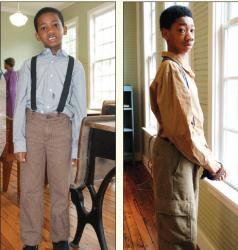
Brothers Graeson and Kincaid Cunnings portray former Rosenwald students Jasper and James during the dramatized “Visit with Former Rosenwald Students.” – Photos by Lisa Smarr
In 1912, the Rosenwald Fund contributed money for the building of such schools for African-Americans in the southern United States. Pine Grove closed in 1950 and for decades remained uninhabited and in disrepair. The school would finally be restored in 2004 as the Pine Grove Community Center on 937 Pineywoods Road. In 2009, the center was added to the National Register of Historic Places.
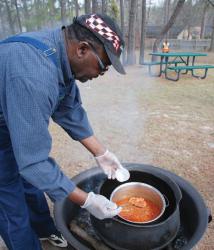
Mack Burgess hosts Catfish Stew Tasting. –Photos by Lisa Smarr
Last February in honor of Black History Month, the Pine Grove Community Center was a site for a heritage celebration. Activities included a dramatization and visit with former Rosenwald students; heritage food, games, and crafts including quilt making, butter churning, catfish stew, and hopscotch; and special guest visits from historical figures “Julius Rosenwald” and “Booker T. Washington”
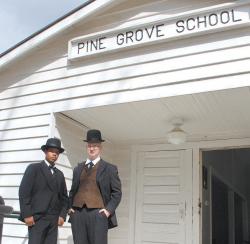
Mr. Booker T. Washington (left), portrayed by Shaban Ghaffur and Mr. Julius Rosenwald, portrayed by Bryan Lee, welcome guests into the Pine Grove School.- Photos by Lisa Smarr
Read full article here.
by Cieslafdn | Mar 15, 2017 | School Restorations
Read more of Mark Price’s article here:
The Charlotte Museum of History, is heading a project intended to save and restore the historic Siloam Rosenwald School. A school built for black children in the 1920s, funded by Julius Rosenwald. The ambitious, $600,000 plan was unveiled last week by preservationists and historians.

A crumbling piece of Charlotte’s African-American history will be transformed into a community attraction. Charlotte-Mecklenburg Historic Landmarks Commission
The nearly century-old building must be moved more than 10 miles south of its original location near UNC Charlotte to the museum’s east Charlotte campus at 3500 Shamrock Drive. There, it will be restored as closely as possible to its original schoolhouse appearance. It will be filled with exhibits on local African-American history and opened to the public for daily tours. The move will happen in the middle of the night to avoid traffic.
The museum intends to raise the money though community donations, including a GoFundMe page. A campaign kick-off has been set for March 25 at a special ticketed event.
Kay Peninger, the head of the museum, realizes it may not be an easy sell to a community with countless social needs. “A community approach built the school and we want a community approach in saving it,” Peninger said. “I think that’s a very meaningful part of the history of the building. It’s a spectacular achievement to think that in the Jim Crow era, when segregation was strong and legally mandated… the community came together for this, blacks and whites, to give money.”
The Siloam School will be the first in the county to be preserved and opened to the public for daily tours. Thousands of people visit the Charlotte Museum of History each year; many of them are children on field trips. Museum officials believe the building and its exhibitions will help provide attention to the region’s often ignored African-American history.

Built in 1921, The Rockwell is Mecklenburg County’s oldest known Rosenwald School. This photo was taken in 1931. HO
In years past, the museum focused largely on European migration to the region, aided by the historic Hezekiah Alexander House on the campus grounds. The house was built around 1774.
“We want our history museum to tell as many of the community’s stories as we can,” said museum trustee Mary Newsom. “The Rosenwald story is one of determination, courage and optimism on the part of African American residents, and we hope we can keep it alive for future generations.”

From the GoFundMe page for Siloam School campaign

Exterior of the Grier Heights community’s handsome 88-year-old Billingsville School, a historic Rosenwald school fully restored. Diedra Laird dlaird@charlotteobserver.com
by Cieslafdn | Mar 10, 2017 | School Restorations
As part of Pittsylvania County’s 250 Year Anniversary, Northside High School Museum will be exploring the history of black education in the county. It will trace the educational pathway for northern Pittsylvania County black students from 1903 until 1969 and feature an exhibit on Rosenwald Schools.
Documenting the school’s early beginnings also includes photos and information about Northside’s more than 80 feeder schools, one and two-room community schools that offered African-American students an elementary education.
Some of these feeder schools were Rosenwald schools.
Virginia’s very own educator Booker T. Washington came up with the concept of Rosenwald schools and approached philanthropist Julius Rosenwald with the idea.
The Rosenwald school building program provided funds for rural schools on behalf of African-American children in the south between the Civil War and the Civil Rights era. There were possibly 360 Rosenwald schools in Virginia and at least 16 in Pittsylvania County.
The museum is located at Corner Road Baptist Church in the Riceville-Java community. 1444 Riceville Rd, Java, VA 24565.

Google Maps Screenshot



















Recent Comments